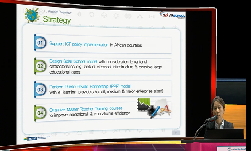Sport psychology is a booming field. Specialists in all areas of sports are now aware that mental preparation of athletes is as important as physical preparation because what makes the difference between two equally skilled athletes in a competition ...
http://chineseinput.net/에서 pinyin(병음)방식으로 중국어를 변환할 수 있습니다.
변환된 중국어를 복사하여 사용하시면 됩니다.
- 中文 을 입력하시려면 zhongwen을 입력하시고 space를누르시면됩니다.
- 北京 을 입력하시려면 beijing을 입력하시고 space를 누르시면 됩니다.
Application of sport psychology to music performance: A study based on a review of sport psychology literature and selected interviews with professional musicians.
한글로보기https://www.riss.kr/link?id=T11140486
- 저자
-
발행사항
[S.l.]: Arizona State University 2006
-
학위수여대학
Arizona State University
-
수여연도
2006
-
작성언어
영어
- 주제어
-
학위
D.M.A.
-
페이지수
185 p.
-
지도교수/심사위원
Adviser: Martin Schuring.
-
0
상세조회 -
0
다운로드
부가정보
다국어 초록 (Multilingual Abstract)
After surveying the major sport psychology literature, the author formulated a set of interview questions. Six performing musicians from different areas of music performance, different cultural backgrounds, and different career stages were interviewed. The sample of musicians included an orchestra musician, a singer, a collaborative pianist and a conductor. They also represented the United States, France, Puerto Rico and Quebec.
In this paper the author describes the main principles of sport psychology: goal setting, pre-event routines, visualization, focus, arousal regulation (energy levels), and optimal performance. Then, based on the interviews, the author applies these principles to music performance. The interviews allow the author to explore the extent to which selected professional musicians apply sport psychology principles. It also helps to determine how the concepts can be adapted to best serve musicians and can be use as a basis for further studies.
The document is organized into seven chapters: (I) Introduction; (II) Structure of the Preparation---for a competition or a performance---(topics covered: Goal Setting, Organization of the Practice Sessions and Pre-Event Routine); (III) Tools for Enhancement (this includes all the different types of imagery or visualization); (IV) Interference; (V) Psychological Skills leading to Optimal Performance (topics covered: Energy Level Regulation and Focus); (VI) Optimal Performance (includes the concept: "being in the zone"); and (VII) Conclusion.
Sport psychology is a booming field. Specialists in all areas of sports are now aware that mental preparation of athletes is as important as physical preparation because what makes the difference between two equally skilled athletes in a competition is his or her mental readiness to perform. The principles of sport psychology translate very well to the field of music performance because the highly competitive field of music performance involves a similar pressure to perform well at a given time when the pressure is on. Playing a musical instrument or singing also demands a high degree of muscular control and coordination that can either be facilitated or inhibited by the musician's mental disposition. This study takes advantage of the extensive research and rapid advancement of sport psychology by applying its concepts to music performance.
After surveying the major sport psychology literature, the author formulated a set of interview questions. Six performing musicians from different areas of music performance, different cultural backgrounds, and different career stages were interviewed. The sample of musicians included an orchestra musician, a singer, a collaborative pianist and a conductor. They also represented the United States, France, Puerto Rico and Quebec.
In this paper the author describes the main principles of sport psychology: goal setting, pre-event routines, visualization, focus, arousal regulation (energy levels), and optimal performance. Then, based on the interviews, the author applies these principles to music performance. The interviews allow the author to explore the extent to which selected professional musicians apply sport psychology principles. It also helps to determine how the concepts can be adapted to best serve musicians and can be use as a basis for further studies.
The document is organized into seven chapters: (I) Introduction; (II) Structure of the Preparation---for a competition or a performance---(topics covered: Goal Setting, Organization of the Practice Sessions and Pre-Event Routine); (III) Tools for Enhancement (this includes all the different types of imagery or visualization); (IV) Interference; (V) Psychological Skills leading to Optimal Performance (topics covered: Energy Level Regulation and Focus); (VI) Optimal Performance (includes the concept: "being in the zone"); and (VII) Conclusion.
분석정보
연관 공개강의(KOCW)
-

Psychology of Adolescence
이화여자대학교 유성경 -

Education Policy at the Party Conferences
Teachers TV Teachers TV -

Alcohol Education: Here's What We Want
Teachers TV Teachers TV -

2014 이러닝 국제 콘퍼런스 : What is the Lessons from Education Support Project~
한국교육정보진흥협회 Boseon, Kim -

Personal Finance Education: The Money Quiz
Teachers TV Teachers TV






